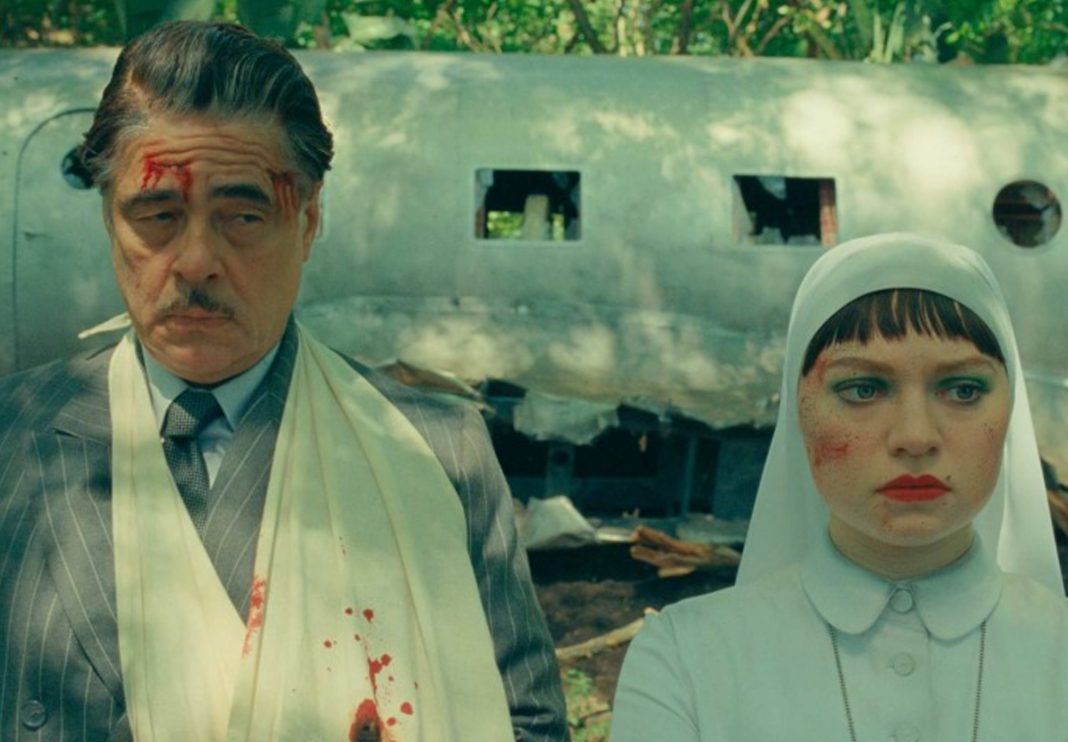Wes Anderson returns with The Phoenician Scheme, a visually rich and whimsically quirky mid-century tale centered on Anatole Zsa-Zsa Korda, a gruff industrialist who narrowly escapes assassination attempts and finds himself navigating a tangled web of family secrets, shady business deals, and global intrigue. Featuring an all-star cast led by Benicio del Toro, the film offers Anderson’s signature symmetrical framing, dry humor, and eccentric characters. Yet beneath the meticulously crafted style and comedic moments lies a story that struggles to reach the emotional depth and complexity audiences have come to expect from the auteur’s best work. From tense negotiations in a politically unstable Middle Eastern territory to unexpected family revelations, The Phoenician Scheme is at once charming and frustratingly shallow — a mid-century adventure that dazzles the eyes but leaves the heart wanting more.
A crash landing into 1950s intrigue
Set against the backdrop of 1950, The Phoenician Scheme opens with Anatole Zsa-Zsa Korda (Benicio del Toro), a mysterious and world-weary industrial magnate, surviving yet another assassination attempt. His private plane, badly damaged, crashes in a remote field, prompting premature obituary headlines to rush to print. But Korda has other plans — inspired by a surreal vision of Heaven, he decides to rewrite his will, leaving his vast empire to his estranged daughter, Leisl (Mia Threapleton), a nun with a conflicted past.
From the start, Anderson leans into his familiar visual and narrative style: meticulously composed shots, quirky character traits, and a whimsical mid-century aesthetic. Korda embodies the archetypal Anderson antihero — eccentric, guarded, and burdened with a shadowy history involving espionage, poison paranoia, and an ever-present fruit crate of live grenades. This sets the tone for a journey that blends political intrigue, family tensions, and a sprawling, if occasionally meandering, global adventure.
A family divided and a world in chaos
Leisl’s reluctance to inherit her father’s empire runs deeper than her convent vows; she harbors suspicions about Korda’s possible involvement in the deaths of several of his wives, including her own mother. Yet personal grievances are soon overshadowed by urgent external threats. While Korda has been recovering, rival factions have destabilized the rivet market — a key resource for his ambitious infrastructure project in the unstable Middle Eastern territory known as Greater Independent Phoenicia.
To salvage his empire, Korda enlists Leisl and his Norwegian tutor-turned-secretary Bjorn (Michael Cera, who embraces an endearingly goofy accent) on a diplomatic mission filled with colorful allies and adversaries. Among them are a local prince (Riz Ahmed), a French nightclub owner sporting a fez (Mathieu Amalric), and an assortment of American power players portrayed by Bryan Cranston, Tom Hanks, and Jeffrey Wright. Adding to the tangled web is Korda’s scheming half-brother Nubar, played by Benedict Cumberbatch sporting an outrageously fake beard. This cast of characters, while rich in talent, sometimes feels like an overstuffed ensemble that the script struggles to balance.
Anderson’s style on display but missing the heart
Unlike Anderson’s recent baroque efforts such as The French Dispatch or Asteroid City, The Phoenician Scheme opts for a relatively straightforward narrative, abandoning stories-within-stories and complex structural devices. The film unfolds episodically as Korda and company navigate the perils and politics of Phoenicia, dodging assassins and revolutionary fervor alike. However, this simplicity comes at a cost: the story often feels elliptical and uneven, with the trademark Anderson visual flourishes — symmetrical framing, whip pans, and meticulously designed sets — sometimes overshadowing the plot.
This film also marks the first time Anderson has worked without longtime cinematographer Robert Yeoman, and while this may partially explain some of the film’s wavering visual coherence, the core issue lies deeper. Korda, while intriguing, lacks the nuanced flaws and warmth that made Anderson’s earlier protagonists unforgettable. He neither possesses the tortured charm of a Royal Tenenbaum nor the melancholy charisma of a Gustave H. Instead, we glimpse inside his psyche only through repeated black-and-white dream sequences depicting his post-mortem encounters — a clever but ultimately thin device that serves more as a stage for cameo appearances from Anderson’s troupe than meaningful character insight.
Comedy and quirk: Anderson’s saving Grace
At times, The Phoenician Scheme skirts dangerously close to the kind of overly precious quirkiness that critics often wrongly attribute to Anderson. However, it is Anderson’s singular comedic sensibility that repeatedly rescues the film. Few filmmakers can deliver a punchline or visual gag with the precision and timing that Anderson commands. Even when the jokes themselves lack sharpness, the way he frames and paces them yields genuine laughs. The film’s tonal shifts — from dry wit to unexpectedly gory moments — add a surprising edge to what might otherwise be a lightweight vintage romp.
Del Toro’s performance is a highlight, embodying the gruff, enigmatic Korda with a mix of world-weariness and underlying menace. Michael Cera’s Bjorn provides much-needed comic relief with his deadpan delivery and goofy accent, while Riz Ahmed’s prince exudes cool menace. The supporting cast, including heavy hitters like Scarlett Johansson and Benedict Cumberbatch, add texture, even if their characters sometimes feel like mere plot devices.
A beautiful but Hollow adventure
The Phoenician Scheme will satisfy loyal Anderson fans craving his signature aesthetic and eccentric humor, but it ultimately falls short of the emotional resonance and narrative depth that defined his best work. The film’s straightforward storytelling and episodic structure make it more accessible than some of his recent, more labyrinthine projects — but that accessibility comes at the cost of character development and thematic complexity.
For viewers willing to immerse themselves in a quirky, visually sumptuous mid-century caper populated by eccentric characters and laced with dry humor, The Phoenician Scheme offers an enjoyable if somewhat shallow adventure. However, those seeking the emotional complexity and human warmth that elevate Anderson’s finest films might find this latest effort a minor detour rather than a triumphant return.
Director: Wes Anderson
Writer: Wes Anderson
Starring: Benicio del Toro, Mia Threapleton, Michael Cera, Riz Ahmed, Tom Hanks, Bryan Cranston, Mathieu Amalric, Scarlett Johansson, Benedict Cumberbatch
Release Date: May 30, 2025



